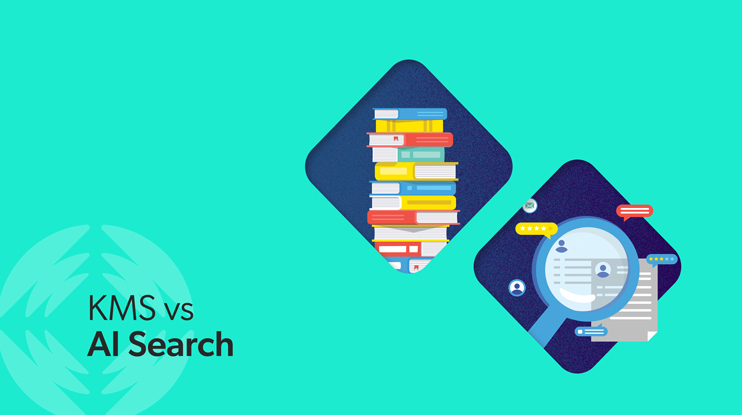Does AI search make for a more effective knowledge management system? When it comes to customer service, the answer lies in a single word: effort.
Effort is now the defining factor in brand perception. According to our 2025 Customer Experience Relevance Report:
- 84% of customers feel they have to put in a moderate or high amount of effort to find information or get help.
- 53% say their biggest frustration is not being able to easily search for and find what they need on their own.
- 72% will abandon a brand after a negative self-service experience.
That’s where AI search changes the game. While traditional knowledge management systems store knowledge, an AI search platform transforms it into accessible, context-aware guidance. Paired with generative AI, it doesn’t just surface articles—it anticipates needs, shortens resolution times, and delivers relevant content exactly when and where it’s needed.
And none of that is possible without a strong knowledge management foundation.
In this post, we’ll explore why pairing AI search with a mature KM strategy is essential for reducing customer effort, enhancing support outcomes, and meeting today’s soaring service expectations.
The Difference Between Knowledge Management Systems and AI Search
There are important differences between these solutions, both in terms of how they work with organizational knowledge and the enterprise objectives they support.
1. A Knowledge Management System is for Creating and Storing Content
Most organizations use knowledge management systems for authoring, editing, publishing, and organizing knowledge base content. This includes any existing knowledge base articles, step-by-step video tutorials, and documentation.
Traditionally, customers, customer service agents, employees, and partners use some form of knowledge base to find the content they need.
Examples of Knowledge Management Systems
- Internal knowledge base software: An employee-facing system that stores and organizes critical company information, policies, procedures, FAQs, and best practices.
- Knowledge management platform: Internal and/or external facing. Goes beyond simple knowledge base functionality by facilitating knowledge creation, collaboration, and accessibility
- Document Management System (DMS): For storing, managing, and tracking electronic documents. Offers version control, access control, and document search capabilities.
- Content Management System (CMS): Primarily for managing website content, but can also be used for a knowledge management process. Think: creating, editing, and publishing valuable information in various content formats.
- Collaboration tool: Offers real-time chat, video conferencing, and task management. Collaboration tools facilitate communication, cooperation, and knowledge sharing. Some organizations use Slack for Case Swarming.
- Learning Management System (LMS): Designed for delivering and managing employee training programs, training materials, online courses, assessments, and performance tracking tools.
An AI search platform doesn’t store or generate content. Instead, it brings existing sources of content into a unified index, which supports better findability in a variety of user contexts. AI search solves for findability in ways that a knowledge management system typically cannot:
- Retrieve the right information from many different sources
- Tailor search results based on user context in a variety of channels
- Recommend knowledge resources based on explicit inputs (that is, searching for both the keywords entered as well as the intent behind the keyword), or unexpressed customer needs (like the next best question that similar users have asked)
- Free up agents to focus on the customer instead of searching for knowledge
- Tangibly boost efficiency metrics like hold time, handle time, first contact resolution (FCR), and escalation/transfer rates
- Offer search relevance, unified index, hybrid search, a suite of AI models, and reporting, thanks to a a full-stack closed loop system architecture
Most enterprises already keep vast amounts of documents and data in various repositories; the challenge isn’t storing and organizing it (with a knowledge management system), but finding a way to put it to use in the right situations—through a unified, highly relevant experience.
In other words, it’s not an either/or discussion. You can use both capabilities to maximize agent and customer effectiveness. Yet some enterprises find that implementing both solutions isn’t necessary: an AI search platform can work with important information from almost any source, including structured and unstructured data.
Relevant reading: How GenAI Question Answering Delivers +11% Self-Service Success
2. A Knowledge Management System Only Does So Much
You can have all the collective knowledge in the world, but it’s not much use if customers and agents can’t find it in their moment of need.
Many knowledge management systems still rely on keyword search. Often authors use different keywords depending on their level of expertise.
Trouba is a good example: before implementing AI search, new agents had to memorize 5,400 jump words just to get inside of the head of the authors. Coveo, considered a best-in-class solution for search relevance by Gartner, Forrester, and IDC, helped Trouba:
- Reduce average handle time (AHT) by nearly 12%
- Save 2.5 days of training per agent with Google-like search relevance
- Achieve 5% reduction in transfer rate
The 99% Problem
Even a finely tuned knowledge management system can leave much to be desired, at least in terms of timely, relevant results. It’s one of the reasons why 99% of companies struggle to deliver relevant enterprise search results to their users.
On the other hand, an AI search platform continually consumes and analyzes user intent based on history, permissions, and interactions. It combines this understanding with lexical, semantic, and vector-based search capabilities, alongside machine learning (ML) models and analytics.
Closed-Loop Learning
AI search platforms use closed-loop learning to continually refine and train their layered ML models, with every query and click. As a result, relevance is always improving, which in turn improves handle time, FCR, and customer effort overall.
| Knowledge Management System | AI Search Platform | |
| Focus | Capturing, storing, organizing, and sharing knowledge assets | Searching, retrieving, and surfacing information from various sources |
| Content Types | Structured (documents, reports) and unstructured (emails, videos, discussions) | Almost any (including web pages, files, database records, and Salesforce objects) |
| Content Management | Manual or semi-automated | Automated content classification, tagging, and organization |
| Search Capabilities | Keyword-based search | Advanced search functionalities like natural language processing (NLP), semantic search |
| Personalization | Limited personalization based on user roles or profiles | Can personalize experiences based on user history, preferences, and context |
| Insights & Analytics | Basic reporting on user activity and content access | Advanced analytics to identify any knowledge gap, user behavior patterns, and content effectiveness |
| Implementation | Can be complex to set up and maintain, depending on features | Generally easier to implement and integrate with existing systems |
How AI Enables Connected Digital Support Journeys
In its Knowledge Management Maturity Model Survey, TSIA stresses the value of an enterprise-wide knowledge management program. For one thing, an enterprise-wide KM supports better business outcomes in the contact center:
- 33% lower incident cost per case
- 3.1% higher support renewal rates
- 1.7% lower support voluntary attrition rates
To encompass the whole enterprise, a knowledge management program needs some ability to unify various sources of valuable information. And that ability must be able to intelligently stitch that knowledge together for end-to-end digital support journeys.
SAP Concur Case Study
When SAP Concur—the industry-leading cloud-based travel, expense, and invoice management provider—reduced search queries by 80% per visit, it did so by:
- Unifying existing knowledge sources with AI
- Extending knowledge across enterprise channels
- Layering in generative AI (GenAI) to further improve accuracy and speed
Their principal goal was to improve customer retention. For an enterprise of that scale, a knowledge management system alone wouldn’t cut it. To connect the entire customer lifecycle, they needed the intelligence, speed, and automation provided by AI search.
Generative Answering
The SAP Concur case study shows how AI search platforms add in another layer that’s mostly absent from knowledge management systems: generative answering.
GenAI answering provides secure, contextually relevant answers to complex customer questions, saving agents’ time from having to jump through many articles and/or knowledge bases to piece together an answer. In many cases, generative answering can do it for them.
Coveo was first to market with an enterprise-grade generative answering capability. Leveraging advanced retrieval augmented generation (RAG) (in addition to 17+ search ranking factors, AI, business rules and more) to generate answers only from an enterprise’s domain-specific content.
Few knowledge management systems, if any, can offer this additional layer of relevance. And SAP Concur is far from the only trail blazer to partner with Coveo—Xero, Forcepoint, F5 Networks, and many more are harnessing Relevance Generative Answering to great effect.
Agentic AI with Knowledge Retrieval
Recently, Salesforce made noise with the introduction of Agentforce, an agentic AI solution. Since the advent of Agentforce, other top players have introduced agentic AI solutions of their own.
Relevant reading: Understanding Agentic AI: The Next Frontier of Artificial Intelligence
Central to agentic AI’s selling proposition is autonomy. Rather than deploy a GenAI-enabled service bot, you can deploy a GenAI-enabled service bot capable of working autonomously—be it automating frontline self-service interactions, continuously improving customer and agent flows, or otherwise.
Fundamentally, agentic AI needs data, including institutional knowledge, to deliver value. Because it’s one thing to tell your agentic AI to simply retrieve data from your knowledge management system; it’s another thing to build in advanced ranking, hybrid search, and an AI layer that unifies company knowledge across systems.
Learn more about knowledge management and agentic AI.
Going Forward: Choose Wisely
Knowledge management systems and AI search platforms serve different but complementary purposes. If anything, the arrival of GenAI and agentic AI only reaffirm this reality.
Choosing the right knowledge management solution will depend on your enterprise’s needs and priorities. Many organizations use a combination of both solutions, to create a comprehensive information management strategy.
Ultimately, modern AI search platforms open the door to what comes next: a more connected and deeply personalized customer experience. To orchestrate this experience at scale, to continuously read and respond to user needs, requires much more than a knowledge management system can achieve on its own.
Dig Deeper
Did you know that 66% of leaders are dissatisfied with their GenAI progress? Join David Atallah and Mathieu Lavoie-Sabourin, Coveo’s GenAI experts, and product marketer Patricia Petit Liang for a deep dive into proven strategies to maximize GenAI’s potential. Discover how to transform scattered structured and unstructured data into accurate, actionable and reliable answering.
Webinar: GenAI Success Begins with Content: 5 Strategies for Accuracy & Precision


